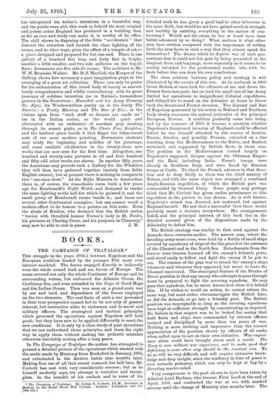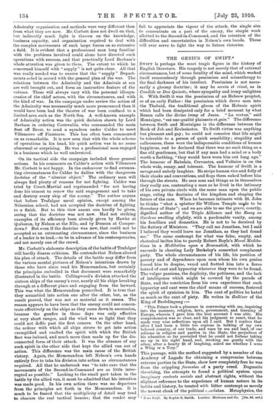BOOKS.
THE CAMPAIGN OF TRAFALGAR.* THE struggle in the years 1804-5 between Napoleon and the European coalition headed by the younger Pitt must ever interest mankind. The forces engaged directly or indirectly were the whole armed land and sea forces of Europe. The scene covered not only the whole Continent of Europe and its surrounding waters, but embraced the Atlantic Ocean, the Caribbean Sea, and even extended to the Cape of Good Hope and the Indian Ocean. Then was seen on a grand scale war by sea and land, and dependence of the forces employed on the two elements. The real facts of such a war presented in their true perspective cannot fail to be not only of general interest, but instructive alike to statesmen and to naval and military officers. The strategical and tactical principles which governed the operations against Napoleon still bold good; but they have now to be applied differently to meet the new conditions. It is only by a close study of past operations that we can understand those principles, and learn the right way to apply them without making the pedantic mistakes otherwise inevitably arising after a long peace.
In The Campaign of Trafalgar the author has attempted to present a detailed picture of the operations which started with the sortie made by Missiessy from Rochefort in January, 1805, and culminated in the decisive battle nine months later. Making free use of all that recent research has laid bare, Mr. Corbett has met with very considerable success ; but as he himself modestly says, his attempt is tentative and incom- plete. In the breadth of his outlook and in some of his
• The Campaign of Trafalgar. By Julian S. Corbett, LL.M., Lecturer in History to the Royal Naval War College. London : Lougmans and Co. [16s. net.]
detailed work he has given a good lead to other labourers in the same field ; but would he not have gained much in strength and lucidity by omitting everything in the nature of con- troversy ? Would not the cause he has at heart have been better advanced by so doing? What matters it what other men have written compared with the importance of setting forth the true facts in such a way that they almost speak for themselves ? The drama which he depicts was of such pro- portions that it could not but gain by being presented in the simplest form and language, more especially as it seems to be mainly intended for the professional reader, who with the facts before him can draw his own conclusions.
The close relation between policy and strategy is weir illustrated by the events of this war. At its outbreak in 1803 Great Britain at once took the offensive at sea and drove the French fleets into port; but on land the small size of her Army limited her operations to insignificant Colonial expeditions, and obliged her to stand on the defensive at home to throw back the threatened French invasion. The distrust and fear of Napoleon generated by his action in Holland and Northern. Italy slowly overcame the mutual jealousies of the principal European Powers. A coalition gradually came into being, and by the summer of 1805 it became a question whether Napoleon's threatened invasion of England could be effected before he was himself attacked by the armies of Austria, Russia, Sweden, and possibly Prussia, extended on a line reaching from the Mediterranean to the Baltic, and flanked, sustained, and supported by British fleets in those seas. The position in the Mediterranean turned largely on Napoleon's supposed designs against the Ottoman Empire and the East, including India. French troops were already in Southern Italy, and were faced by Russian troops at Corfu. To check the French advance in that direc- tion and to deny Sicily to them was the chief anxiety of Nelson, and with the same object was arranged a combined Anglo-Russian expedition, of which the British part was commanded by General Craig. Some people may perhaps think that Mr. Corbett has given undue prominence to this expedition in the picture he has drawn. As is well known, Napoleon's attack was directed, not eastward, but against England herself. He saw that a successful blow there would probably mean a decision everywhere. His arrangements failed, and the principal interest of this book lies in the detailed account given of the dispositions made by the Admiralty to defeat him.
The British strategy was similar to that used against the Armada three centuries earlier. The narrow seas, where the invading army must cross, were held by a flotilla of small ships covered by squadrons of ships of the line placed at the entrance of the Channel and in the North Sea. Detachments from the former were thrown forward off the enemy's Atlantic ports, and stood ready to follow and fight the enemy if he put to sea. The essence of the plan was to attack the enemy's ships whenever and wherever they appeared, but never to leave the Channel uncovered. The strategical feature of the Straits of Dover position is that any enemy who attempts to pass through must be prepared to fight the covering squadron. He may pass that squadron, but he never knows how close it is behind him. If he wishes to avoid an action, he cannot return the same way, but must either• circumnavigate the British Isles, as did the Armada, or go into a friendly port. The British position was impregnable so long as the covering squadrons were kept at sufficient strength by concentrating as. required. No failure in that respect was to be looked for, seeing that both fleets and ships were commanded by veteran officers trained and disciplined by more than ten years of war. Nothing is more striking and impressive than the correct appreciation of the position shown by officers of all ranks when called upon to act on their own initiative. War experi- ence alone could have brought about such a result. The Navy is now without war experience, and to make good that deficiency in some other way should be the constant aim. To do so will be very difficult, and will require extensive know- ledge and deep insight, since the tendency in time of peace is ever towards pedantry, which can only be kept at bay by a directing master-mind.
Very conspicuous is the part shown to have been taken by Admiral Lord Barham, who became First Lord at the end of April, 1805, and conducted the war at sea with marked success until the change of Ministry nine months later. The Admiralty organisation and methods were very different then from what they are now. Mr. Corbett does not dwell on that, but indirectly much light is thrown on the knowledge, business capacity, and organisation required to deal with the complex movements of such large forces on so extensive a field. It is evident that a professional man long familiar with the problems involved could alone have directed such operations with success, and that practically Lord Barham's whole attention was given to them. The extent to which he concerned himself with " supply" is not quite clear. All that was really needed was to ensure that the " supply " Depart- ments acted in accord with the general plan of the war. The relations between the Admiralty and the Admirals at sea are well brought out, and form an instructive feature of the volume. These will always vary with the personal idiosyn- crasies of the chief actors, with the circumstances, and with the kind of war. In the campaign under review the action of the Admiralty was necessarily much more pronounced than it would have been had the theatre of war been confined to a limited area such as the North Sea. A well-known example of Admiralty action was the quick decision shown by Lord Barham in ordering Cornwallis, who commanded the main fleet off Brest, to send a squadron under Calder to meet Villeneuve off Finisterre. This has often been commented on as remarkable. It is now seen that with the whole scheme of operations in his head, his quick action was in no sense abnormal or surprising. He was a professional man engaged in a business which he well understood.
On its tactical side the campaign included three general actions. In his comments on Calder's action with Villeneuve Mr. Corbett is not happy. In the endeavour to find extenua- ting circumstances for Calder he dallies with the dangerous doctrine of the " ulterior object." The ordinary man will always find plenty of reasons for not fighting. Calder was tried by Court-Martial and reprimanded " for not having done his utmost to renew the said engagement and to take and destroy every ship of the enemy." The author argues that before Trafalgar naval opinion, except among the Nelsonian school, had not accepted the doctrine of fighting to a finish. But to this view assent can hardly be given, seeing that the doctrine was not new. Had not striking examples of its efficiency been already given by Hawke at Quiberon, by Nelson at the Nile, and by Duncan at Camper- down P But even if the doctrine was new, that could not be accepted as an extenuating circumstance, since the business of a leader is to lead,—to be in advance of his contemporaries, and not merely one of the crowd.
Mr. Corbett's elaborate description of the battle of Trafalgar will hardly disarm criticism. He contends that Nelson altered his plan of attack. The details of the battle may differ from the various mental pictures of Nelson's intentions drawn by those who have since read his Memorandum, but certainly the principles embodied in that document were remarkably illustrated in the battle. Collingwood's division attacked the sixteen ships of the enemy's rear, nearly all his ships breaking through at a different place and engaging from the leeward. This was what the Memorandum prescribed. It is true that they scrambled into action one after the other, but, as the result proved, that was not so material as it seems. The reason appears to have been that the enemy could not concen- trate effectively on the ships as they came down in succession, because the gunfire in those days was only effective at very short ranges, and the wind was so light that they could not defile past the first corners. On the other hand, the ardour with which all ships strove to get into action exemplified and exalted the spirit with which the British fleet was imbued, and much more than made up for the dis- connected form of their attack. It was the absence of any such spirit in the other side that kept the allied van out of action. This difference was the main cause of the British victory. Again, the Memorandum left Nelson's own hands entirely free to take his division into action as circumstances required. All that he undertook was "to take care that the movements of the Second-in-Command are as little inter- rupted as possible." Looking to the small part taken in the battle by the allied van, it must be admitted that his intention was made good. In his own action there was no departure from the principles set forth in the Memorandum. It is much to be feared that the multiplicity of detail may tend to obscure the real tactical lessons ; that the reader may fail to appreciate the vigour of the attack, the single aim to concentrate on a part of the enemy, the simple work allotted to the Second-in-Command, and the retention of the difficulties and uncertainties in Nelson's own hands. These will ever serve to light the way to future victories.







































 Previous page
Previous page